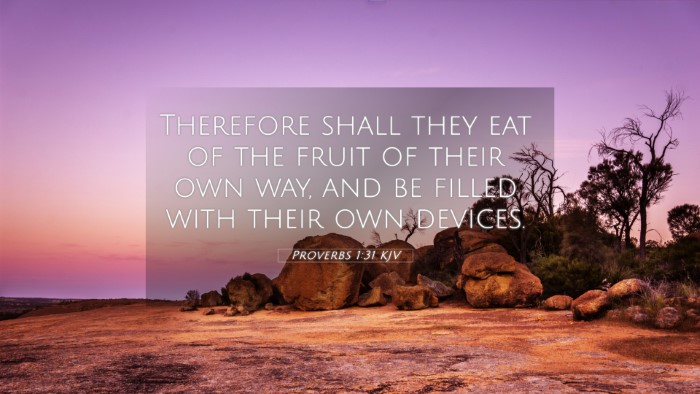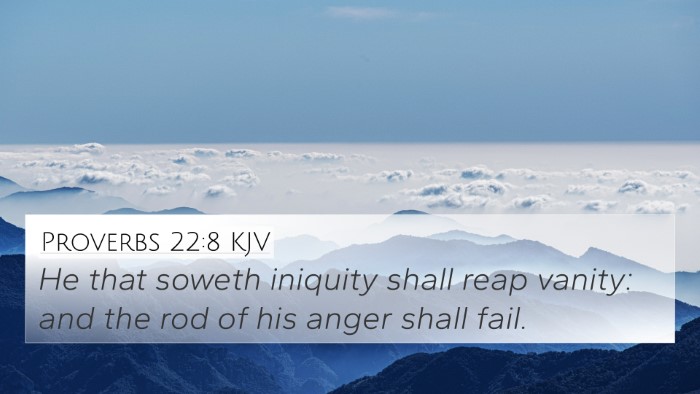Understanding Proverbs 1:31
Proverbs 1:31 states: “Therefore shall they eat the fruit of their own way, and be filled with their own devices.” This verse emphasizes the consequences of one’s choices and the inevitable outcomes of following one's own counsel instead of divine wisdom.
Summary of Insights
The verse encapsulates the theme of rewards and repercussions associated with behavior that diverges from wisdom. Through a blend of insights from:
- Matthew Henry
- Albert Barnes
- Adam Clarke
we can discern a richer understanding of its meaning.
Matthew Henry's Perspective
Matthew Henry interprets this verse by focusing on the idea that individuals will reap what they sow. He emphasizes that those who reject God's wisdom will ultimately face the repercussions of their actions. The phrase “eat the fruit of their own way” suggests that their choices lead to self-inflicted consequences, highlighting a natural law of spiritual retribution.
Albert Barnes' Insights
Albert Barnes discusses the metaphor used in the verse. The 'fruit' is a metaphor for the results of one’s actions. He explains that this fruit does not nourish but leads to a hollow fulfillment filled with regret. Barnes emphasizes that when individuals rely solely on their understanding, they engage in self-deception leading to spiritual emptiness.
Adam Clarke's Analysis
Adam Clarke adds depth by commenting on the 'devices' mentioned in the verse. He articulates that these devices represent cunning plans that are often contrary to divine will. Clarke highlights that the verse warns against the folly of pride, illustrating a disconnect between human wisdom and divine guidance.
Key Themes and Biblical Cross-References
This verse touches upon several core themes in Scripture:
- Consequences of Choices: The idea that our decisions have direct consequences, emphasized in Galatians 6:7-8.
- Divine vs. Human Wisdom: A divisive theme seen in 1 Corinthians 1:19-25.
- Rebellion against God: A recurring warning in Proverbs 14:12.
- The futility of self-reliance: Seen in Jeremiah 17:5-6.
- Your own understanding vs. God’s plan: Proverbs 3:5-6.
- The importance of heeding wisdom: Proverbs 8:33-36.
- The results of a fool's ways: Proverbs 10:21.
Practical Application
The insights from Proverbs 1:31 serve as a reminder for believers to seek God’s wisdom and guidance in their daily lives. By recognizing the potential outcomes of one’s decisions, one can cultivate a mindset geared towards alignment with divine principles.
Connecting Themes through Biblical Cross-Referencing
Exploring cross-references enhances our understanding of Biblical texts, enabling us to see the interconnectedness of Scripture. Here are some pertinent connections:
- Proverbs 11:3: “The integrity of the upright guides them, but the crookedness of the treacherous destroys them.”
- Isaiah 3:10-11: “Tell the righteous that it shall be well with them, for they shall eat the fruit of their deeds. Woe to the wicked! It shall be ill with him, for what his hands have dealt out shall be done to him.”
- Matthew 7:17-20: “So, every healthy tree bears good fruit, but the diseased tree bears bad fruit.”
- James 1:15: “Then desire when it has conceived gives birth to sin, and sin when it is fully grown brings forth death.”
- Romans 2:6: “He will render to each one according to his works.”
- Proverbs 22:8: “Whoever sows injustice will reap calamity, and the rod of his fury will fail.”
- Hosea 10:12: “Sow for yourselves righteousness; reap steadfast love; break up your fallow ground, for it is time to seek the LORD, that he may come and rain righteousness upon you.”
How to Use Bible Cross-References
For those seeking to deepen their understanding through Bible cross-referencing, consider these suggestions:
- Utilize a Bible concordance to find keywords associated with the verse.
- Engage in cross-reference Bible study by identifying themes and exploring related passages.
- Create a personal cross-reference guide by noting parallels between scriptures.
- Participate in group Bible studies focused on thematic Bible verse connections for collaborative insights.
Conclusion
In conclusion, Proverbs 1:31 serves as a solemn reminder of the heart's orientation and the weight of our choices. By employing comprehensive Bible cross-reference materials and exploring connections across Scripture, believers can enrich their understanding and respond wisely to the promptings of God's Word.









